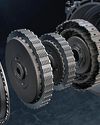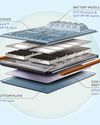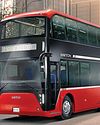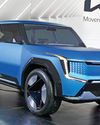
Mahindra & Mahindra will reveal its much-awaited new-generation Scorpio (codename: Z101) with a new moniker, Scorpio-N, on 27 June, while the current Scorpio will continue to be sold alongside and henceforth called the Scorpio Classic.
With the launch of the new Scorpio-N, M&M will have a total of seven ladder-frame vehicles in its portfolio. The list, at present, includes the Thar, Bolero, Bolero Neo, Marazzo, Alturas G4 and the Scorpio Classic. The ladder frame line-up will further expand when the carmaker launches the five-door iteration of the Thar in 2023.
While the company does have monocoque-based models in its portfolio – like the XUV300 and the XUV700 – the number of ladder frame models in its line-up is higher; in fact, it's more than any other car brand in India. In today’s times when monocoque constructions are preferred, why is Mahindra still betting big on ladder frame models?
The ladder frame legacy Mahindra entered the automotive business in 1945 when it began assembling Willy’s Jeep under license in India. A tough, four-wheel drive, body-on-frame vehicle was intended to take on the challenging Indian roads with ease. Soon M&M was established as the Jeep manufacturer in India, and it later went on to produce light commercial vehicles and tractors. In the years that followed, the company moved on from being just the assembler of SUVs to makers of one.
This story is from the {{IssueName}} edition of {{MagazineName}}.
Start your 7-day Magzter GOLD free trial to access thousands of curated premium stories, and 9,000+ magazines and newspapers.
Already a subscriber ? Sign In
This story is from the {{IssueName}} edition of {{MagazineName}}.
Start your 7-day Magzter GOLD free trial to access thousands of curated premium stories, and 9,000+ magazines and newspapers.
Already a subscriber? Sign In

Spain's Fersa Group invests in India-based Delux Bearings
Besides theRs100 croreinvestment, the Indian company gets access toadvanced technologies and bearings with arange of applications that willhelpinits global growth strategy, writes Manobhava Baruah.

Tata Autocomp to open compact dual-clutch transmission plant
Amidthe country’s growing need for personal mobility with easy manoeuvrability, comes the demand for vehicles with automatic transmission. Tata AutoCompisready tomovein writes Shruti Mishra.

Pankaj Munjal-backed Hero Motors raises equity from GEF Cap
The company willinvest Rs1,500 crore over thenextthree years andit expects 60 percent ofits turnover to come fromelectric vehicle parts. Itaims to becomea Global EV Solutions Company from India

New age thermoplastics for next-generation EV batteries
Saudi-based global materials major SABIChas developed cutting edgein fire-resistant polymers and flame-retardant materials that comply with various EV battery safety standards across the world.

Switch Mobility to meet growing e-bus demand with fresh capex
Oncourse for abillion-dollar business, the company is exploringa possibility of operating satellite factories across the country to serve different geographies, write ShahkarAbidi and Ketan Thakkar.

Kia India to invest Rs 2,000 crore in EVS, to introduce new e-RV in 2025
New investmentto drive R&D, infrastructure development and manufacturing capabilities. The company willlocally produce EVsin India with possibility of exports as well, writes Mayank Dhingra.

"The government has given enough time for indigenisation but the industry has not taken it seriously"
Amitabh Saran, Founder and CEO, Altigreen, shares his views on problems inthe EV industry and battery localisation solutions with Amit Vijay M.

TATA MOTORS SEES ONE INTWO CARS SOLDAS EVS BY 2030
The company aims to offer wider choices withnew EVs that may straddle a pricebracket of Rs20to 40lakhinthe coming years, writes Ketan Thakkar.

MG Motor India in expansion drive, to invest $100 million
The investment willbe usedtoramp up existing production capacity from1.2to1.4-15lakh units per annum atthe automaker's Halol plantin Gujarat, writes Ketan Thakkar.

"Technology and its multiplier effect are driving business transformations and customer experiences"
Technical Centre India is one of Continental’s largest research and development centres in the world, andasa Centre of Competence’ it also develops customised products for the BRIC countries.